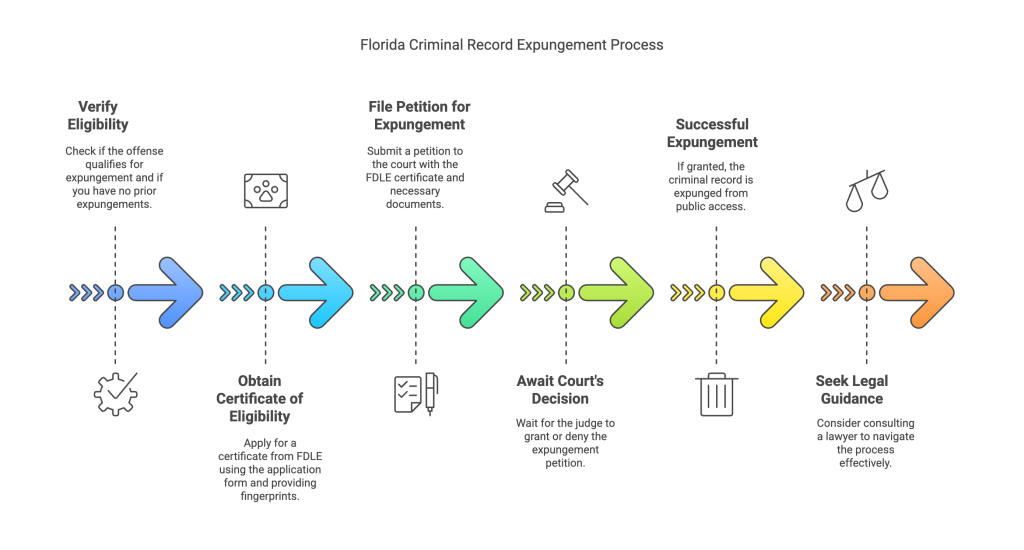Navigating the employment landscape can be challenging when criminal records come into play, especially in states like Florida where laws and processes regarding expunged records can be complex. For both employers seeking to make informed hiring decisions and job seekers aiming to move past prior convictions, understanding how expunged records impact employment is crucial. This guide will provide a comprehensive look at how expunged records affect employment in Florida and will offer insights into the legal frameworks, rights, and responsibilities involved. We will also dive into related aspects such as background checks, compliance requirements, and the broader context of criminal justice reform.
Key Takeaways
- Expunged records are erased from public access, allowing individuals to legally deny having such records on job applications.
- Employers are legally prohibited from asking about expunged records, and failing to comply can result in penalties.
- Florida law prevents expunged records from appearing in standard background checks, giving job seekers a fair chance at employment.
- The process of expunging a record involves verifying eligibility, obtaining necessary documents, and filing a petition with the court.
- Changes in criminal justice reform, including "Ban the Box" initiatives, aim to create fairer hiring practices and greater opportunities for those with cleared records.
Understanding Expunged Records and Sealed Records
What Are Expunged Records?
Expunged records are criminal records that have been erased from public access. Legally, it's as if they never existed. These records include arrests, charges, or convictions that an individual successfully petitioned to be removed from their record.
Sealed records, on the other hand, are not destroyed. They are hidden from most public views but still exist within the system. They may be accessed through a court order. The main difference lies in accessibilityâexpunged records vanish from databases used in background checks, while sealed records stay in place but remain difficult to obtain.
Relevance to Employment
For employers, expunged records should not appear in a standard background check. When a record is expunged, it's removed from commercial databases. This means you shouldn't consider it when hiring because it represents an erased event.
For you as a job seeker, an expunged record won't surface during typical employment screenings. This is crucial if you're trying to move forward in your career without the burden of a past record hanging over your potential. However, sealed records might require additional steps to ensure they're not wrongly considered in hiring decisions.
This distinction gives you a clean slate, at least from the perspective of most employers. Awareness of this can alleviate concerns about previous minor scrapes with the law that have since been expunged. But always verify your status, especially if you're in sensitive roles where deeper checks might apply.
Understanding these differences helps both employers and job seekers navigate the hiring process more confidently. Are you ensuring compliance with these distinctions in your hiring practices? And if you're seeking employment, do you know the status of your record?
Florida Criminal Record Expungement

The process of expunging a criminal record in Florida involves several specific steps. Knowing these steps can help streamline your journey toward a clearer record.
First, verify eligibility. Only certain offenses qualify for expungement. Additionally, you must not have had any other records expunged or sealed previously. Florida allows only one expungement per person, except in rare cases.
Next, you need to obtain a certificate of eligibility from the Florida Department of Law Enforcement (FDLE). This certificate is essential for your court petition. To apply, you must fill out the FDLE application form, provide your fingerprints, and pay the required fee. This step checks if your record meets the expungement requirements.
After obtaining the certificate of eligibility, file a petition for expungement with the court. The petition includes a sworn statement affirming you are eligible. Alongside this, you must submit your FDLE certificate and any other necessary documents.
Note that the FDLE plays a key role in processing expungement applications. They review your application, check your background, and determine your eligibility. If approved, they issue the certificate, without which you cannot proceed to court.
Await the court's decision. If the judge grants your petition, the record should be expunged. This process may take several months, so patience and attention to detail throughout are essential.
Successful expungement means the record is removed from public access. However, certain agencies may still access it under specific conditions. Make sure you understand these exceptions as part of managing your expectations.
To explore each part of this process thoroughly, consider seeking legal guidance. Doing so can prevent delays and ensure all criteria are met.
Legal Framework and Job Seeker Protections
When it comes to expunged records and employment, Florida law aims to strike a balance between protecting an individualâs privacy and allowing employers to make informed hiring decisions.
Expunged Records Hiring Laws
Florida law generally prevents employers from asking about expunged records. Once a record is expunged, you can legally deny its existence on job applications. Employers who dig into expunged records face penalties, reinforcing the importance of compliance.
Ban the Box initiatives are also gaining traction. These movements encourage removing criminal history questions from initial job applications, giving candidates a fair chance to showcase their qualifications before their past is considered. While Ban the Box isn't mandatory statewide, some local ordinances support this practice, showing a shift towards equitable hiring.
Job Seeker Protections in Florida
Job seekers in Florida enjoy several protections concerning expunged records. Under state law, no public or private employer can legally ask about an expunged record. This means the law supports your right to move forward without the shadow of past mistakes.
Federal laws, like the Fair Credit Reporting Act (FCRA), add another layer of protection. The FCRA requires accuracy in background checks, ensuring that outdated or expunged records donât slip through. If you discover errors related to expunged records, you have the right to dispute and correct them under these federal guidelines.
Staying aware of these rights helps you navigate job searches more confidently, knowing that your expunged records should not impede your employment opportunities.
Conducting Employment Background Checks
Background Check Errors in Florida
Background checks are an essential component of the hiring process. But they aren't foolproof. Errors often sneak in, complicating the lives of job seekers and employers alike. Outdated data, incorrect entries, and, sometimes, expunged records erroneously showing up are common issues.
Say you're a job seeker with a record expunged years ago. In an ideal world, this wouldn't come up in a background check. But mistakes happen. This can unfairly affect your job prospects.
If you find an error, take immediate action. Start by obtaining a copy of your report. Contact the background check company and dispute the mistake. Under the Fair Credit Reporting Act (FCRA), they must investigate and correct any inaccuracies. Document everything. Keep a detailed record of your communications and follow up promptly.
Your employer or potential employer also needs to comply with FCRA rules. If they decide not to hire you based on a background check, they must let you know and provide a copy of the report along with a Summary of Your Rights.
Employer Compliance Regarding Expunged Records
For employers, ensuring compliance with the law is crucial. Some best practices include training your hiring team about local laws regarding expunged records. Ensure they know what questions are off-limits. Never ask about expunged records directly.
Consider using third-party services for checks. Companies accredited by the Professional Background Screening Association (PBSA) offer reliable, compliant checks. They have rigorous standards to minimize errors and protect individuals' rights.
Remember, an error-free background check process isn't just legal. It's fair. Make it a part of your human resources policy to be thorough and respectful of privacy, and you'll likely attract better candidates while staying on the right side of the law.
The Impact of Criminal Justice Reform on Hiring
Recent Developments
Reform in criminal justice is reshaping the hiring landscape. Efforts to introduce fairer practices are making strides.
Why do these reforms matter for you as an employer or a job seeker? They aim to create opportunities and remove obstacles for individuals with past convictions.
Consider the impact of Ban the Box initiatives. These policies restrict the timing of criminal history inquiries during the hiring process. They give applicants a chance to be evaluated on their skills first.
Data from the National Employment Law Project shows these reforms are effective. Employment rates for people with expunged records have shown improvement.
Fair Hiring Practices in Florida
Look at what some Florida companies are doing. They are pioneers in adopting fair hiring practices.
Take the hospitality sectorâseveral hotels now emphasize skills and competencies over past records. This change boosts workforce diversity.
Here's another success story: a tech firm in Miami made headlines by employing individuals with expunged records. They reported not just reduced turnover but also increased community goodwill.
What can you learn from this? Implementing fair practices can enhance your company's reputation and widen your talent pool. You're not only helping the community, but you're also enriching your workplace culture.
Conclusion
Understanding expunged records can significantly impact your approach to employment in Florida. For employers, it's crucial to align hiring practices with state laws to ensure fairness and legal compliance. Engaging with resources like FCRA guidelines and accredited third-party background check services can help avoid costly errors.
As a job seeker, knowing your rights regarding expunged records is empowering. Be proactive. Ensure that any potential inaccuracies in your background check are promptly addressed. Familiarize yourself with both state protections and federal guidelines to navigate your job search more effectively.
Keep an eye on ongoing criminal justice reforms. They continue to shape hiring practices. These changes reflect a growing emphasis on fairness and inclusivity, benefiting both employers and candidates with expunged records.
Ultimately, awareness and education are your best tools. Whether you're hiring or job hunting, stay informed, uphold fair practices, and advocate for a workplace that's equitable for everyone.
Frequently Asked Questions (FAQs)
Can expunged records show up on a background check in Florida?
Expunged records in Florida are not available to the public and typically should not show up in a standard background check. However, law enforcement agencies and certain governmental bodies may have access.
How can employers verify expunged records in Florida?
Employers cannot verify expunged records through normal channels. Such records are sealed. If youâre an employer seeking verification, it would usually require the applicantâs disclosed consent and may only be feasible if there's a legitimate legal reason.
What steps should job seekers take to ensure their expunged records are accurate?
- Request a personal background check to confirm accuracy.
- Contact the Florida Department of Law Enforcement for any discrepancies.
- Maintain documentation of the expungement order.
Are there penalties for employers who consider expunged records in Florida
Employers could face legal consequences if they unlawfully use expunged records to make hiring decisions. It's important for employers to adhere to state laws regarding expunged information.
Can you apply for expungement on your own, or is a lawyer needed?
You can apply for expungement on your own in Florida, but hiring a lawyer may streamline the process and ensure compliance with legal requirements.
How does Floridaâs expungement process differ from other states?
Florida requires a certificate of eligibility before filing for expungement. Each state can have different waiting periods and eligibility criteria. In Florida, only one arrest can be expunged in a lifetime.
What industries in Florida commonly deal with expunged record issues?
Healthcare, education, and finance often require thorough background checks where expunged records might become an issue.
What information remains available even after records are expunged?
Arrest information and associated public records become inaccessible, but agencies like law enforcement may keep certain access.
How long does Floridaâs expungement process typically take?
The process can take several months, usually around 6-12 months from application to court approval, depending on the caseload and complexity.
What should you do if an expunged record appears in a background check?
- Contact the background check provider immediately to correct the information.
- Provide documentation of the expungement to clear the error.Â
Definitions
1. Expunged Records
Expunged records are criminal records that have been legally removed from public access. Once expunged, these records are erased from most databases, and you can deny their existence in most scenarios. This ensures they wonât appear during standard employment background checks, offering you a fresh start.
2. Sealed Records
Sealed records are criminal records that are hidden from public view but still exist within the legal system. Unlike expunged records, they can be accessed through a court order. While less accessible than regular records, they might still appear in certain specialized background checks.
3. Fair Credit Reporting Act (FCRA)
The Fair Credit Reporting Act (FCRA) is a federal law that ensures the accuracy, fairness, and privacy of information in background reports. It requires employers to inform you when negative decisions are made based on your record and gives you the right to review and dispute inaccuracies.
4. Ban the Box
Ban the Box is an initiative that encourages employers to remove questions about criminal history from job applications. This helps candidates be considered for their skills and experience first, delaying inquiries about their criminal background until later in the hiring process.
5. Certificate of Eligibility
A Certificate of Eligibility is a document you must obtain to apply for expunging or sealing a criminal record. Issued by the Florida Department of Law Enforcement, it confirms you meet the legal requirements for expungement or sealing and is required before court petitions can proceed.

GCheck Editorial Team
Meet the GCheck Editorial Team, your trusted source for insightful and up-to-date information in the world of employment background checks. Committed to delivering the latest trends, best practices, and industry insights, our team is dedicated to keeping you informed.
With a passion for ensuring accuracy, compliance, and efficiency in background screening, we are your go-to experts in the field. Stay tuned for our comprehensive articles, guides, and analysis, designed to empower businesses and individuals with the knowledge they need to make informed decisions.
At GCheck, we're here to guide you through the complexities of background checks, every step of the way.






